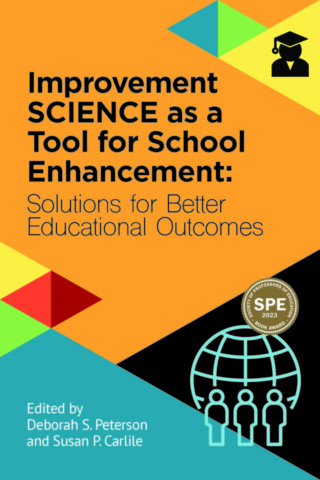Susan P. Carlile
Susan P. Carlile (MA, University of Oregon; graduate work in education, University of Washington and Harvard University) is a professor of practice and program lead for the Educational Leadership and Policy Program. She has facilitated the leadership development of over 600 school leaders, received 18 grants for her work, and presented and published in dozens of state, national and international forums of leadership. Most recently, her research has focused on examining the issues facing women in leadership positions and strategies for navigating the workplace to ensure gender, racial, ethnic, linguistic and socio-economic equity in education.
Books by Susan P. Carlile:

2023 SPE Outstanding Book Award Honorable Mention
Improvement Science as a Tool for School Enhancement is a collection of equity-focused improvement science-in-action, school-based case studies led by practitioners. Chapter authors tell us how and why improvement science principles make system-wide improvements in classroom practice, how they learned from the problems encountered and further, how they were then able to make changes within a school or district.
Library E-Books
We are signed up with aggregators who resell networkable e-book editions of our titles to academic libraries. These editions, priced at par with simultaneous hardcover editions of our titles, are not available direct from Stylus.
These aggregators offer a variety of plans to libraries, such as simultaneous access by multiple library patrons, and access to portions of titles at a fraction of list price under what is commonly referred to as a "patron-driven demand" model.
E-books are now distributed via VitalSource
VitalSource offer a more seamless way to access the ebook, and add some great new features including text-to-voice. You own your ebook for life, it is simply hosted on the vendor website, working much like Kindle and Nook. Click here to see more detailed information on this process.

A 2022 SPE Outstanding Book Honorable Mention
Improvement Science: Promoting Equity in Schools is intended for classroom teachers, school leaders, and district leaders charged with leading improvement efforts in schools. From questions such as “how do I develop a love of reading in my classroom?” to “how can I better manage student behavior during independent learning time?” to “what should we do to make sure kids of all races read at grade level by 3rd grade” to “how could we include families of all backgrounds as partners in learning” or “how do we increase our graduation rate among underserved students," this book shares real-life examples from those who are currently leading equity-focused improvement in our classrooms and schools. If you are curious about how Improvement Science has been used, or how others have succeeded—or failed—at equity-focused improvement efforts in our classrooms and in our schools, or if you’re wondering how to spur discussions in school districts, universities, and communities about leading equity-focused improvement, this book is for you. Teachers, students, family members, community members, principals and superintendents will be inspired to embrace Improvement Science as a method to improve equity in their schools.
The book helps people new to Improvement Science to understand the basic steps to implement the process. If you’re a beginner, it provides some basic steps and a resource (https://www.carnegiefoundation.org/our-ideas/six-core-principles-improvement/) to help you understand the process better; for those with some experience, the book will be an excellent refresher and tool with functional suggestions to take your practice further.
1. Form a Team.
2. Examine Data.
3. Ask Why.
4. Read Research.
5. Get Perspective of Those Closest to the Problem.
6. Plan the Change.
After you’ve done the above, then it’s time to test one idea, using short Plan Do Study Act cycles. These are short improvement cycles. Students are only in our classrooms generally for one year, so the cycles need to be short, perhaps even as short as one week, to ensure that every instructional move we are making truly does improve the experience of the students.Readers of Improvement Science: Promoting Equity in Schools will be taking an important step toward achieving the goal of producing socially just classrooms and schools.
WATCH: Meet the Authors (ZOOM recording from #CPED21 Virtual Convening, 10/20/21).
To learn more about Improvement Science and see our full list of books in this area, please click through to the Myers Education Press Improvement Science website.
Perfect for courses such as: Culturally Responsive Learning Environments; Educating For Equity And Social Justice; Cultivating Culturally Responsive Classrooms; Integrating Methods And Curriculum Design; Inquiry, Assessment, And Instructional Design; Foundations Of Culturally And Linguistically Responsive Practice; Math Literacy; Physical Education; Professional Collaboration In Education; Language And Literacy Development Of Diverse Learners; Equal Opportunity: Racism; Diversity And Equity In Schools; Cultural Proficiency In Schools; Language And Power In Education; Teaching For Equity In Literacy; Supportive Classroom Communities; Cultural Diversity In Literature; Engaging Students In Writing; Introduction To School Leadership; Introduction To School Improvement; Teacher Leadership And School Improvement
Library E-Books
We are signed up with aggregators who resell networkable e-book editions of our titles to academic libraries. These editions, priced at par with simultaneous hardcover editions of our titles, are not available direct from Stylus.
These aggregators offer a variety of plans to libraries, such as simultaneous access by multiple library patrons, and access to portions of titles at a fraction of list price under what is commonly referred to as a "patron-driven demand" model.
E-books are now distributed via VitalSource
VitalSource offer a more seamless way to access the ebook, and add some great new features including text-to-voice. You own your ebook for life, it is simply hosted on the vendor website, working much like Kindle and Nook. Click here to see more detailed information on this process.



